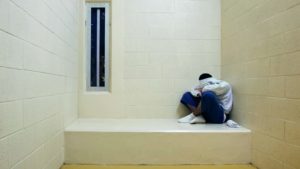
Image courtesy of WeAreHereMovement.com
Lawmakers in the nation’s capital are prepping for an upcoming vote that would spark major changes in the District’s juvenile justice system. Current policies governing court procedures and conditions of youth confinement are up in the air, so legislators are banking on the vote going as planned.
According to ThinkProgress, the D.C. Council unanimously voted in favor of a bill last week that would no longer allow youth to be thrown in prison with adults, locked away in solitary confinement or face the possibility of a life sentence without parole.
The Comprehensive Youth Justice Amendment Act of 2016, introduced by council member Kenyan McDuffie, includes 17 sweeping changes to the D.C. juvenile justice system, placing priority on youth rehabilitation services, not imprisonment.
If the bill passes, authorities will no longer be able to detain juveniles for status offenses, like running away from home or truancy, ThinkProgress reports. The District courts will no longer have the option to hand down mandatory minimum sentences to juvenile defendants, either.
“What really is important is that we know that whenever a young person commits an offense and walks through the doors of a courthouse in D.C., it’s a turning point in their lives,” McDuffie told ThinkProgress. “And how the government responds at that critical moment can help turn their trajectory around.”
McDuffie’s bill is also focused on ensuring access to future opportunities for young offenders, such as employment, housing and education. That’s why he’s proposing that juvenile arrest records remain sealed or possibly expunged.
Among other reforms proposed in the bill are: expanding voluntary victim-offender mediation in lieu of prosecution; providing juveniles who were charged as adults the opportunity for release after 20 years; and requiring the transfer of minors in adult prisons to the Department of Youth Rehabilitative Services.
ThinkProgress reports that the council is expected to vote on the bill a second time, after a few more revisions are made. Local stakeholders, along with a coalition of youth justice and civil rights advocates, have voiced their support for McDuffie’s piece of legislation.
According to a report by nonprofit D.C. Lawyers for Youth, youth-involved crime has decreased in recent years, with the number of juvenile arrests falling 27 percent since 2009. Delinquency requests against youth have also plummeted 29 percent.
Daniel Okonkwo, executive director of D.C. Lawyers for Youth, said he hopes the proposed reforms will do more to continue this downward trend.
“The system is shrinking, and that’s a good thing because that is indicative of the fact that we’re finding other ways to treat young people who are involved in crime, or finding ways to engage young people before they get involved in delinquent behavior,” Okonkwo said.
While the plans outlined in McDuffie’s bill seek to overhaul the District’s juvenile justice system, DCLY Legal & Policy Director Eduardo Ferrer thinks there should also be programs put in place to prevent early delinquent behavior. Such interventions would ultimately keep minors from entering the system at all.
“One of the biggest challenges is that most of the young people I represent are in their teen years and adolescence,” Ferrer said. “So we are often trying to confront a host of issues they’ve been struggling with — and their families have been struggling with — for years, independent of the juvenile justice system itself: housing issues, poverty, poor schools, lack of adequate education.”
McDuffie acknowledged that intervention services are needed, but also noted that the District’s social services are lacking. The council member said he often sees caseworkers who don’t make referrals for treatment on time and probation officers who don’t provide youth with the services they need. The underfunding and understaffing of social services are also major issues.


